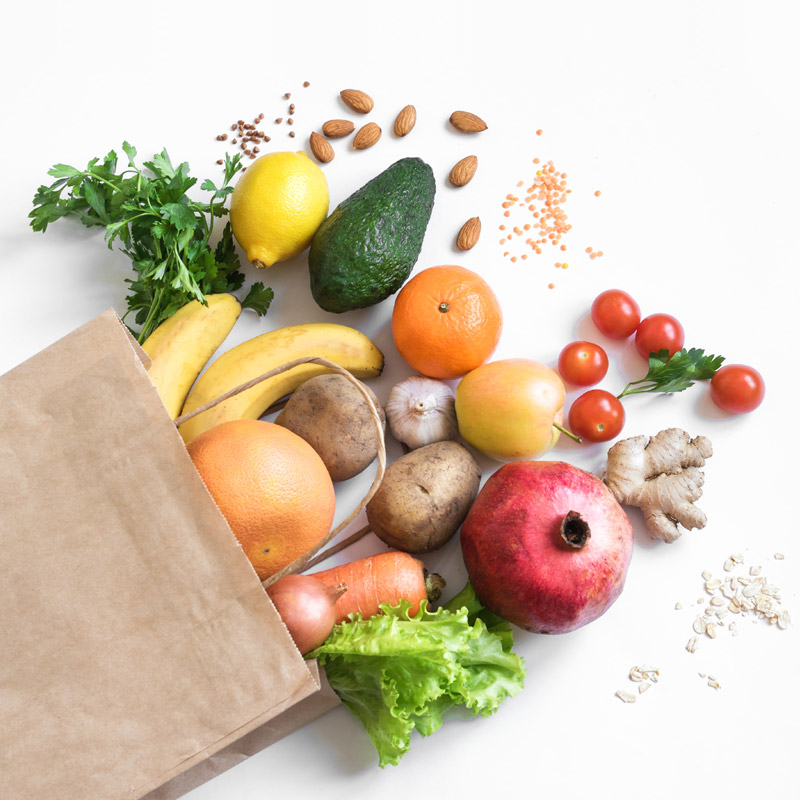Well-being - 5-a-day
Take care of yourself by eating 5 portions of fruit and vegetables a day.
The “5-a-day” campaign is a scientific programme launched in the US by the National Cancer Institute in 1989. The formula is very simple: eat at least 5 portions (between 500 and 800 g in total) of fruit and vegetables per day, in order to give your body all the vitamins, minerals and dietary fibres it needs.
Why is it important to eat fruit and vegetables at least 5 times a day?
If you look at the tables which show, in descending order, the nutritional content in a serving of different foods, you may be surprised to see that foods of animal origin, rather than fruit and vegetables, often come first. This may be surprising as most people think that some nutrients, such as vitamins, are only found in fruit and vegetables! In reality, even foods of animal origin are a source of vitamins and minerals. Indeed, the best sources of certain vitamins such as PP are found in meat and fish.
So why are we advised to eat 5 portions of fruit and vegetables a day?
To understand this, we must consider that every food offers an array of nutrients: there are no good foods and bad foods, because there are no good and bad nutrients, just some nutrients that require a moderate intake.

The well-being offered by fruit and vegetables
Certain nutrients, such as saturated fats, should only be eaten in moderation. Eating 80 g parmesan cheese provides almost 1 g calcium, which completely covers the requirement for that nutrient (for a woman, almost entirely). However, it also provides almost 15 g of saturated lipids, which is a lot when you consider that, in a 2000 kcal diet, the maximum recommended amount is 20 g. This does not mean that we should not eat parmesan cheese (which is an excellent food, especially from the organoleptic point of view), but rather that we should not eat 80 g of it 5 times a day.
This problem does not exist for fruit and vegetables: in fact, given that they are almost fat-free (apart from oleaginous fruits and oilseeds) and completely free from cholesterol, they can be safely consumed five times a day or even more.
Fruit and vegetables also contain other very important biomolecules: antioxidants. Most of these molecules, which defend against free radicals, are of plant origin. This means that, if we want to have a good supply, and therefore be well protected from oxidative damage, it is important to incorporate at least 5 portions of fruit and vegetables per day in our diet.
Unfortunately, we do not have a data sheet with a table of antioxidant content , as we still lack sufficient data or studies on their concentration in all foods. However, what we do know is that the main dietary source of antioxidants come from plant foods.
Finally, the calorific value of fruits and vegetables is generally very low, meaning they have the benefit of a low calorific density and a high nutritional density. In fact, a “portion” of dark chocolate (50 g) contains more iron than one of frozen spinach (120 g), but what would happen if we ate 5 portions of chocolate every day?
In short, it is absolutely true that a proper diet must include all kinds of food, but fruit and vegetables should be consumed often, at least 5 times a day!
Why choose organic?
Choosing organic means making a series of specific choices.
100% natural products
During both the production (cultivation or breeding), and all the processing stages, only substances of natural or mineral origin are used: this means no fertilisers, pesticides, herbicides, medicinal products or synthetic chemical preservatives.
GMO Free
Organic farming does not use genetically modified organisms (GMOs).
A cleaner and healthier environment
Organic farming techniques are eco-friendly and respect the natural balance: they limit air and water pollution, avoid excessively exploiting natural resources and soil erosion, prevent the extinction of beneficial organisms, and protect biodiversity in the environment.
Dignity of animals
Animals for slaughter are reared in keeping with their natural life cycles: plenty of outdoor space, a diet based on their needs with 100% plant products, and no use of hormones or artificial growth stimulants. Even their final moments are arranged in such a way as to minimise stress as much as possible and ensure the animals’ well-being.
More fertile lands
The use of organic substances and appropriate agricultural techniques that do not intensively exploit the soil (e.g. through crop rotation, “light” tillage, etc.) serve to improve soil conditions and safeguard natural fertility. Healthy soil produces healthy fruit!
Greater attention to health
Given that a quality diet is a source of well-being, organic produce represents safer choice in terms of guaranteed quality and the wholesomeness of the product.
Protecting producers
Organic farming provides a healthier environment for those living and working in the countryside.
Encouraging research and innovation
Organic farming is not a return to the past: the production systems and techniques used are the result of new skills and a continued commitment to producing healthy and quality products, while minimising the impact on the environment.
Legally-regulated controls and guarantees
Organic farming is regulated by EU regulations 834/07 and 889/08 which mainly affects the production, labelling, control and certification systems and imports from outside the EU, and is valid in all EU countries.

Organic Diet
Choosing to only eat organic produce means taking the road of dietary well-being, in harmony with natural rhythms and resources. Organic produce, grown using only natural substances, is the fruit of a sustainable and strictly monitored agriculture: the result is a diet that becomes a way of life, a conscious choice that is carried forward each day.
The correlation between food and quality of life is a concept that is now rooted in our culture, and can be traced back to the nineteenth century, when the famous philosopher Ludwig Feuerbach wrote, “The mystery of sacrifice or man is what he eats”. It is based on a concept that has never been so topical as it is today: that there is an intrinsic connection between psyche and body.
However, the idea of a healthy and natural diet, which does not require the use of synthetic chemicals such as pesticides and GMOs, is something quite recent. How long have we been eating organic? Organic farming came to Europe in the ‘50s, after World War II. The forerunners of this type of farming were Rudolf Steiner and Englishman Albert Howard, founder of an organic farming school in India. Since then, thanks to a growing awareness of the effects of nutrition on quality of life, there has been a steady rise in its popularity and methods.
It is a common misconception among those approaching the organic world for the first time that an organic diet means a more limited choice of products. In fact, the opposite is true: organic products provide a very diverse range of options. As well as fruit and vegetables, there are derivative and processed products, and that’s not all. You can also enjoy ready-to-eat products that just need heating up, which make up a normal part of a working day for many people. In the “Products” section you will find a broad overview of organic foods.